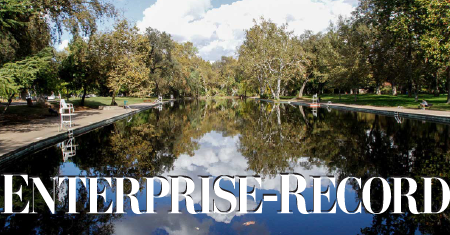Tomorrow is April Fool’s Day, and California’s new minimum wage law — that’s $20 an hour if you work in any number of fast-food restaurants — goes into effect.
I wish I could say the two are related, but such is life in the Golden State these days.
Look: By now, you’ve made up your mind on the fast-food wage issue, and I’m not going to try to change it. You have your reasons for favoring (or opposing) the law, and I’ve got mine.
I do, however, think my reasons might be a little different than yours.
The experience I gained at my first job — which paid $3.15 an hour — taught me so much about life, there’s no way I’d go back to exchange it for anything more lucrative. Sometimes a real-life education is the best long-term investment you could ever hope to make.
At least, it was for me.
I got my start in this business as a freelancer while I was still in high school. The pay was 25 cents per column inch. That meant if I wrote a 10-inch story, I got $2.50. I quickly figured out if I wrote a 40-inch story instead, I got 10 bucks. (Thus began a habit of overwriting that continues to this very day.)
I also learned if I was going to keep gas in the tank of my Dodge Charger, and make those daily drives up to Shasta College, I’d need a second source of income. So, at 18, I started working the late-night shift at Craig Brothers Shell in Corning.
If you were going to work in a gas station in those days, the Craigs were the guys you wanted as bosses. They not only paid higher than minimum wage ($2.65 in those days) — they were the most kind, ethical and considerate people you’d ever want to be around. Plus, we’d work six days on, then two days off — ensuring that every week, we’d get eight hours of overtime pay on our check. And overtime was more than four dollars an hour!
The gas tank of my Charger had never been happier.
In those days, there were actual full-service gas stations, and that’s what we did. Every time a car pulled up, we’d go out and pump the gas. We’d also check the oil, wash the windshield and do anything else the customer requested, including checking the air pressure in the tires. It didn’t matter if it was a 115-degree summer day (perfect for dealing with overheated radiators) or a cold winter night with rain and 40-mile-per-hour winds; when a customer pulled up, you went outside and did your job.
Life lesson number one: If you’ve got a job with a roof over your head, be thankful.
My first day on the job, the price of regular gas was 66 cents a gallon. Exactly one year later, with talk of an “oil shortage” (remember that?) dominating the media, the price had skyrocketed to $1.66. Like anyone who did this job in those days, I got called every name in the book by sticker-shocked customers. The kindest, I think was “communist.” The worst? Use your imagination, and I can pretty much promise you’d be right.
I remember one especially angry guy grabbing a fistful of pennies from his pocket and firing them at me from five feet away, screaming, “Here! This is for you and your buddies in Washington!” (Yes, pennies can hurt.)
Life lesson number two: There’s nothing harder to deal with than people, and no matter what you do, or how well you do it, some people aren’t going to be happy. Learn to deal with it. Grow some thicker skin, because life isn’t easy.
Through it all, though, I learned to appreciate the overwhelming majority of customers who were kind. I learned to value the importance of co-workers who had your back and the invaluable gift of having employers who cared about you as people. I’ve had a lot of great bosses, but I’ve never had any better than Bill or Angus Craig. Their kindness was something I never forgot and something I do my best to emulate with employees even today.
Call those life lessons three, four and five.
Of course, at the time, nobody had yet invented the term “living wage.” It was just understood we were starting at the bottom of the economic food chain and if we wanted to climb up, well, the way to do that was by working hard and learning.
But now? We have politicians enacting laws that could only be conceived by people who have never had to operate a business, much less meet a payroll. And how they’ve determined that fast-food workers should be paid $4 an hour more than millions of other people doing often-critical jobs is beyond me.
And how have businesses reacted to California’s new wage law? By slashing thousands of jobs. Gee. Didn’t see that one coming.
I understand there are plenty of billionaires on this planet who could stand to be a little more generous with their money, especially in terms of wages. I also wonder how many of these people first got ahead in life because of lessons — including a strong work ethic — that they gained after some employer was kind enough to offer them a job.
Feels to me like something pretty big is being lost here. You really can’t put a price on that.
Mike Wolcott is the editor of the Enterprise-Record. He’ll be on vacation next week, and his column will return April 14.
